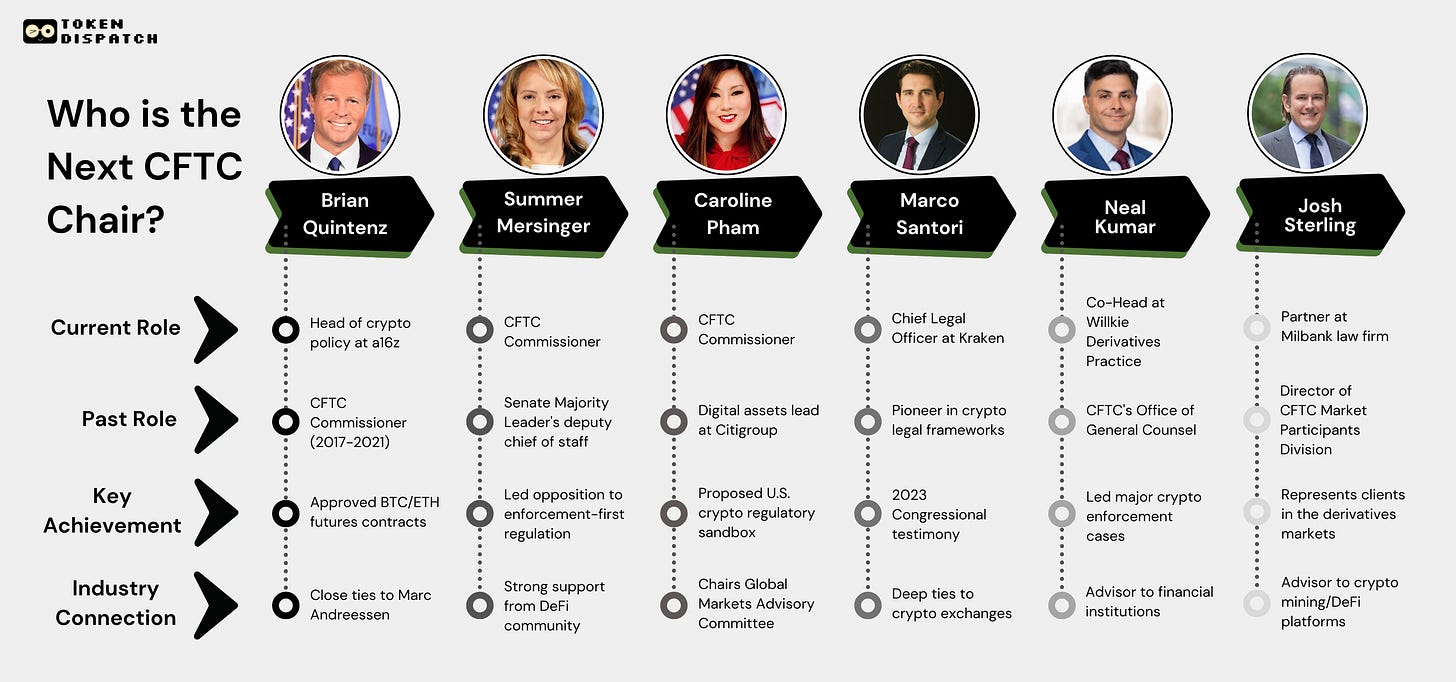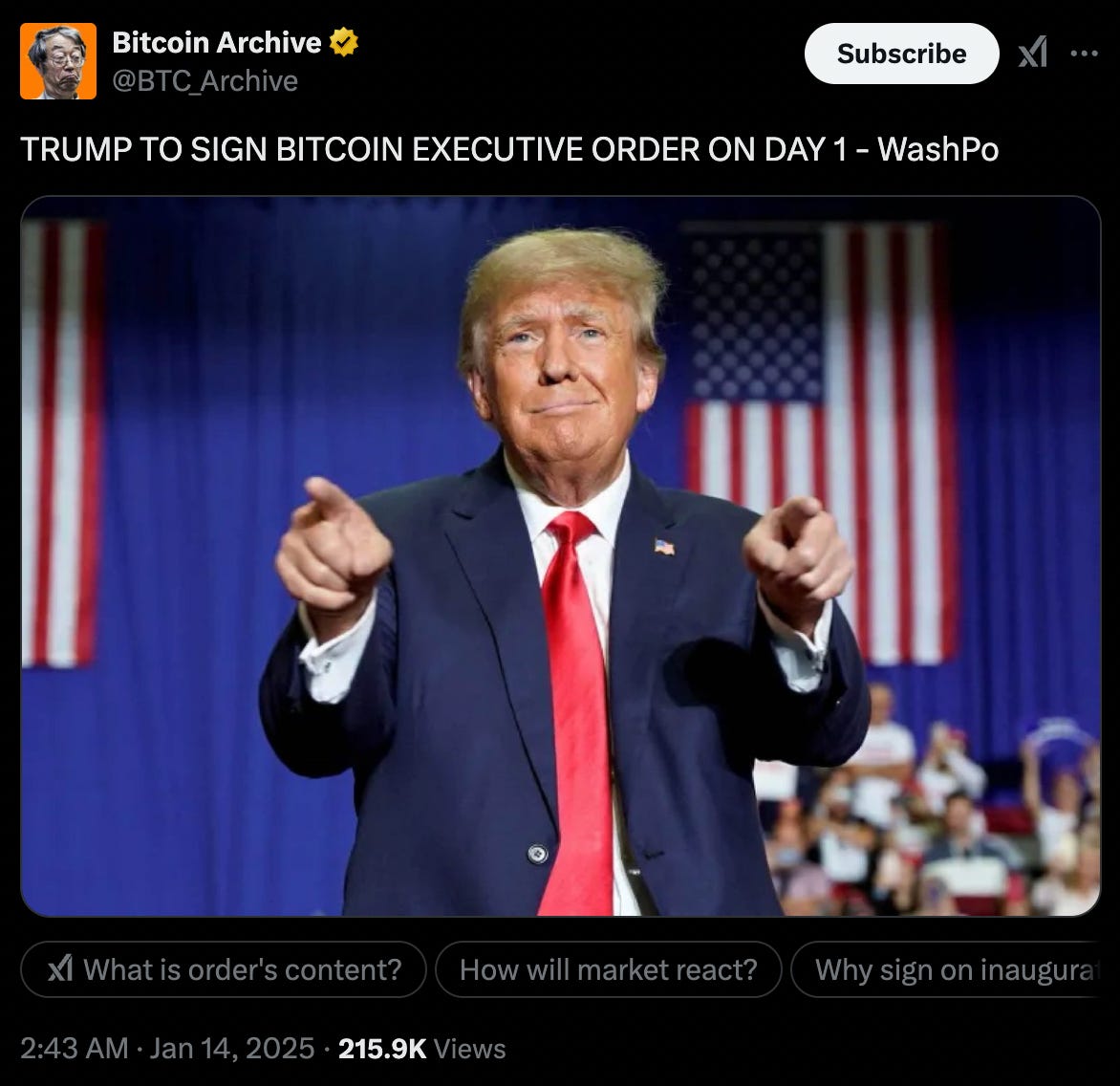The Great Regulatory Reset 🔄
Hello dispatchers! Tuesday’s here.
Washington is experiencing what might be the biggest regulatory exodus in recent memory. The chiefs are clearing their desks.
All eyes are on one particular seat: the leadership of the Commodity Futures Trading Commission.
Here's why we think this might be the most consequential changing of the guard in crypto's history.
Upgrade to paid to get full access to our weekly premium features (Wormhole, Rabbit hole and Mempool) and subscribers only posts. 2025 New Year special limited time offer - 38% off on our annual subscription.
Gary Gensler is leaving. Michael Barr is leaving. Rostin Behnam is leaving.
If this sounds like a mass resignation at a tech startup, think bigger. Much bigger.
The chiefs of nearly every major US financial regulator are clearing their desks before Donald Trump's inauguration.
In the span of just two months.
A complete regulatory reset.
Trump promises to make America "the crypto capital of the planet."
And the architects of Biden's crypto crackdown are choosing to bow out? Not stick around for what promises to be a dramatic policy reversal.
But amid this game of musical chairs, one seat is drawing particular attention: the leadership of the Commodity Futures Trading Commission.
Why? Because while the SEC under Gensler may have hogged the crypto spotlight, the CFTC's influence over digital assets will likely soon eclipse its regulatory cousin.
If pending legislation passes in 2025, the agency could become the primary overseer of crypto markets — a responsibility that would put its new chair at the center of a transformed regulatory landscape.
The stakes couldn't be higher.
The CFTC oversees $500 trillion in trading volumes across currencies and financial derivatives.
Now, it's poised to potentially gain oversight of the spot market for certain digital assets like Bitcoin and Ethereum, where the regulatory landscape remains murky at best.
"Over the past several years, a multitude of domestic and global events tested the resilience of all financial markets," - outgoing CFTC Chair Behnam reflected in his resignation letter.
But those tests may pale in comparison to what's coming next.
As Trump's transition team vets candidates for this crucial position, six names have emerged as frontrunners.
Each brings a different vision for how crypto regulation might evolve under the new administration. At the top of the list are two current CFTC commissioners: Summer Mersinger and Caroline Pham. Both have been vocal critics of the "regulation by enforcement" approach that characterised the Biden years.
Mersinger, in particular, has emerged as a thought leader at the intersection of crypto innovation and consumer protection. Her September dissent on the CFTC's settlement with Uniswap showcased a nuanced understanding of decentralised finance that's rare among regulators.
Then there's Brian Quintenz, currently heading crypto policy at venture capital giant Andreessen Horowitz. His unique position — straddling both the regulatory and innovation sides of the fence — could make him an especially intriguing pick.
Having previously served as a CFTC commissioner from 2017 to 2021, he brings the kind of hybrid experience that might be crucial for navigating crypto's integration into traditional financial markets.
Let's look at who might end up with their hand on crypto's regulatory rudder.
The Domino Effect
This isn't just about filling seats — it's about dismantling what crypto advocates have dubbed "Operation Chokepoint 2.0."
The exodus of Biden-era regulators comes as evidence mounts of a coordinated effort to restrict crypto's access to banking services.
Read: When Banks Can't Bank 🖐🏾
Coinbase's chief legal officer Paul Grewal, after reviewing unredacted FDIC files, confirmed what many had suspected: there was a "coordinated effort to stop a wide variety of crypto activity — everything from basic BTC transactions to more complex offerings."
The stakes became clearer when Federal Reserve Vice Chair Michael Barr — dubbed by some as "The Fed's Debanker-in-Chief" — announced his resignation. His March 2023 statement that the Fed would "likely view it as unsafe and unsound for banks to directly own crypto-assets" had effectively served as a warning shot to banks considering crypto services.
Crypto venture capitalist Nic Carter has been keeping score. His infamous "wanted poster" of anti-crypto officials shows more than half have now announced resignations, stepped down, or been defeated in elections.
The coordinated departure suggests they see the writing on the wall.
And what’s that? Trump's transition team is preparing a regulatory reset.
The Washington Post reports that Day One executive orders are already drafted to address both the "de-banking" issue and the controversial Staff Accounting Bulletin 121 (SAB 121).
This latter point is crucial. SAB 121, which requires firms to record customers' crypto holdings as liabilities on their balance sheets, has been a major roadblock for institutional adoption. Despite bipartisan support for its repeal — the Senate voted 60-38 in favour — Biden's veto kept it in place.
The bulletins repeal alone could unleash a wave of institutional engagement with crypto👇🏻
But Trump's team isn't stopping there.
They're reportedly considering a complete restructuring of the FDIC and potential merger of banking regulators to streamline oversight.
This comes as current FDIC Vice Chair Travis Hill has publicly condemned past banking restrictions on crypto firms.
The ripple effects are already visible in the markets.
Today’s edition is brought to you by Trezor. The hardware wallet to protect your identity and coins. Get exclusive offers.
In The Numbers 🔢
106%
That's how much the crypto OTC market exploded in 2024.
Let's break down this nuclear growth:
Q4 surge: 177% year-over-year
Q2 boom: 110% jump post-ETF launch
Q1 and Q3: 80% and 78% respectively
Stablecoin trading: 311% spike in Q4
According to Finery Markets' data, this wasn't just speculative trading — it represented a fundamental shift in how traditional financial leaders view crypto.
"Traditional financial leaders shifted their stance from scepticism to neutrality or acceptance as the industry matured," Finery's analysts noted, pointing to increasing pathways to "regulated market access."
New Era of Crypto Legislation
The regulatory reset isn't just happening in executive agencies — Congress is gearing up for its own crypto revolution.
Building a Crypto Power Structure
For the first time in US history, both chambers of Congress are establishing dedicated cryptocurrency subcommittees. This isn't just another bureaucratic reshuffling — it's the creation of a permanent power structure for crypto policy-making.
In the Senate, crypto champion Cynthia Lummis is poised to lead the newly created digital asset subcommittee under the Banking Committee. It's a move that Sheila Warren, CEO of the Crypto Council for Innovation, calls perfectly timed: "Senator Lummis is the perfect choice... Not only are she and her team deeply knowledgeable, they're also pragmatic."
Meanwhile, in the House, Rep. Bryan Steil is taking the reins of the Subcommittee on Digital Assets, Financial Technology and Artificial Intelligence. Steil, who's been vocal about the SEC's failure to provide regulatory clarity, brings a reform-minded approach to the role.
The Bitcoin Reserve Question
But perhaps the most intriguing development is the renewed push for a US Bitcoin strategic reserve. Senator Lummis has gone as far as proposing selling a portion of the Federal Reserve's gold holdings to purchase Bitcoin — a suggestion that would have seemed unthinkable just months ago.
The timing is particularly interesting. As the Biden administration moves to sell $6.7 billion worth of Bitcoin seized from the Silk Road, questions are arising about whether this is an attempt to complicate Trump's Bitcoin reserve ambitions.
Follow the Money
The crypto industry isn't just waiting on the sidelines. Major players are already positioning themselves for influence:
Circle: $1 million USDC donation to Trump's inaugural committee
Ripple: A $5 million contribution and an in-person meeting for its CEO with Trump
Additional support flowing in from Kraken, Robinhood, and Ondo Finance
This flood of inaugural donations suggests the industry expects more than just regulatory relief — they're betting on a fundamental reimagining of crypto's role in American finance.
Not everyone's celebrating
While crypto markets surge on promises of a pro-industry regime, some veteran regulators are raising alarm bells.
Elizabeth Warren, the US Senator has a theory:
"Bad actors are also increasingly turning to cryptocurrency to enable money laundering, sanctions evasion, and to finance major national security threats, such as Russia's invasion of Ukraine, North Korea's nuclear program, China's sale of weapons parts to sanctioned nations, and ransomware attacks."
Warren, soon to be the top Democrat on the Senate Banking Committee, demanded answers about crypto's national security implications, in a pointed 31-page letter to Treasury Secretary-designate Scott Bessent.
But her concerns might be falling on deaf ears.
The incoming administration appears more focused on what they view as the risks of not embracing crypto — namely, losing America's competitive edge in global financial innovation.
Token Dispatch View 🔍
Washington's crypto revolution is shaping up to be a historical inflection point in American finance.
But amid the euphoria of pro-crypto appointments and legislative breakthroughs, there's a bigger story.
Not merely about replacing regulators or rewriting rules. It's about America choosing sides in a global race for financial innovation.
The stakes are clear. With the CFTC potentially gaining oversight of crypto spot markets, a potential US Bitcoin strategic reserve on the horizon, and Senator Lummis even suggesting selling Federal Reserve gold to buy Bitcoin, we're watching the foundations of American finance being reimagined.
Warren and other sceptics may raise alarm bells about national security implications, but the incoming administration has made its choice: they view the risk of not embracing crypto as greater than the risks Warren warns about.
Trump's regulatory reset, isn't just about making America "the crypto capital of the planet" — it's about preventing it from becoming a crypto colony.
The simultaneous overhaul of the SEC, CFTC, and banking regulations, combined with new congressional power structures and a potential Bitcoin strategic reserve, suggests something bigger than partisan politics at play.
It looks more like a national strategic pivot. With pro-crypto leaders taking key positions across government, industry-friendly subcommittees in both chambers of Congress, and executive orders ready for Day One, the pieces are in place for a fundamental reimagining of America's relationship with digital assets.
The real test of America's crypto revolution won't come on inauguration day — it'll come in the months and years that follow, as grand visions meet bureaucratic reality.
Because sometimes the hardest part isn't changing the rules.
It's changing the game.
Token Dispatch is a daily crypto newsletter handpicked and crafted with love by human bots. You can find all about us here 🙌
If you want to reach out to 200,000+ subscriber community of the Token Dispatch, you can explore the partnership opportunities with us.
Disclaimer: This newsletter contains sponsored content and affiliate links. All sponsored content is clearly marked. Opinions expressed by sponsors or in sponsored content are their own and do not necessarily reflect the views of this newsletter or its authors. We may receive compensation from featured products/services. Content is for informational purposes only, not financial advice. Trading crypto involves substantial risk - your capital is at risk. Do your own research.
















